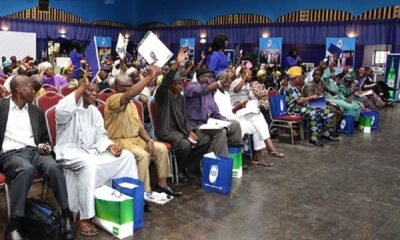Business
Foreign Exchange Market: CBN Rolls Out Dos & Don’t For Commercial Banks

By Cami Ezenwa
The Central Bank of Nigeria (CBN), has rolled out fresh dos and don’ts toward safeguarding Nigeria’s foreign exchange market.
The apex regulator of the Nigerian banking sector, issued the latest rules in a January 31, 2014, CBN Circular referenced: TED/FEM/PUB/ FPC/001/ 001, addressed to commercial banks.
It amongst others ordered commercial banks to limit the Net Open Position (NOP,) of their foreign currency assets and liabilities to 20 per cent of shareholders’ funds.
READ ALSO: Dollar To Naira Rate Today February 1, 2024
The CBN took the decision ostensibly to further boost Naira’s liquidity in the foreign exchange market.
This is coming amidst very deplorable exchange of the national currency, the Naira amidst other currencies, and increased inflationary commodity and service prices in the country.
The Eagle reports that the Dollar To Naira exchange rate at the parallel market otherwise known as the black market at N1500/$ today, February 1, 2024, in Lagos and Abuja.
This is according to parallel market operators in both cities, which means that the Naira further dipped against the USD by N10
Relatedly, the NOP defines a bank’s risk exposure to its foreign exchange-denominated assets, and the CBN directive is expected to shore up the fortunes of Naira in the foreign exchange market.
This is also in the hope while excessive trading and possible abuses by dealers of the currency would be checkmated.
The circular communicating the CBN’s latest stance was signed by the Director of Trade and Exchange, Dr. Hassan Mahmud, , as well as, Mrs. Rita Sike, for Director of Banking Supervision, and was titled, “Harmonization of Reporting Requirements on Foreign Currency Exposures of Banks”.
“Banks whose current NOP exceeds 20 per cent short and 0 per cent long of their shareholders’ funds unimpaired by losses are required to bring them to prudential limit by today, February 1, 2024.
“Banks are also required to have adequate stock of high-quality liquid foreign assets, i.e. cash and government securities.in each significant currency to cover their maturing foreign currency obligations.
In addition, banks should have in place a foreign exchange contingency funding arrangement with other financial institutions.”
“Banks should borrow and lend in the same currency (natural hedging) to avoid currency mismatch associated with foreign currency risk.
The basis of the interest rate for borrowing should be the same as that of lending i.e. there should be no mismatch in floating and fixed interest rates, to mitigate basis risk associated with foreign borrowing interest rate risk.
On Eurobonds, it said any clause of early redemption should be at the instance of the issuer and approval obtained from the CBN in this regard, even if the bond does not qualify as tier-2 capital.
Also, according to the CBN, “All banks are required to adopt adequate treasury and risk management systems to provide oversight of all foreign exchange market exposures and ensure accurate reporting on a timely basis”, the memo instructed.



























